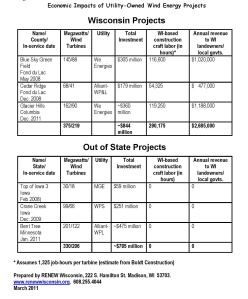March 1, 2011
More information
Michael Vickerman
Executive Director
608.255.4044
mvickerman@renewwisconsin.org
(Madison) - The wind industry in Wisconsin suffered a serious setback when a joint legislative panel voted to suspend the wind siting rule promulgated by the Public Service Commission (PSC) in December, according to RENEW Wisconsin, a statewide renewable energy advocacy group.
The five-to-two vote tracked along party lines, with all five votes to suspend coming from Republican members of the Joint Committee for Review of Administrative Rules (JCRAR).
Many companies involved in windpower supported the PSC’s rule as a workable compromise that would have created a stable and predictable permitting environment for all wind energy systems regulated by local governments. The rule, which was scheduled to take effect today, would have fulfilled the Legislature’s intent to create uniform siting regulations to replace what had become a restrictive hodgepodge of local requirements.
“The committee gave the state of Wisconsin a black eye that, in the view of the wind industry, will linger well into the future,” Vickerman said.
“The suspension rolls the wind permitting environment back to the dark days when wind project developers routinely faced arbitrary and ever-shifting local regulations – the kind of chaos that will hasten their departure from Wisconsin to more business-friendly states.”
“As of today, Wisconsin utilities have placed more megawatts of wind capacity in neighboring states than in Wisconsin. As indicated in the following table, importing wind generation from other states deprives Wisconsin of a valuable source of employment, income for rural residents, and property tax relief,” said Vickerman.
The figures compiled by RENEW show that the 219 utility-owned wind turbines that will be operational by January 1, 2012, will yield nearly $2.7 million per year in potential property tax relief for towns and counties hosting wind projects. All told, these projects will be responsible for nearly 300,000 construction-related job-hours.
“We have a hard time foreseeing in-state utility-scale wind development going forward without statewide siting standards.”
“It’s a shame to see the end of bipartisanship that led to the passage of the rule requirement in 2009. What we are seeing here is a breakdown of governance that will rob the state of one of its brightest economic hopes for the future,” Vickerman said.

Click on table to enlarge.
RENEW Wisconsin is an independent, nonprofit 501(c)(3) organization that acts as a catalyst to advance a sustainable energy future through public policy and private sector initiatives. More information on RENEW’s Web site at www.renewwisconsin.org.
